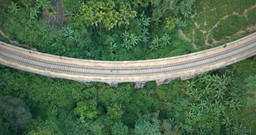- 11 October 2021
Regeneration: Beyond Sustainable Tourism
It’s tough to talk about the future of tourism and hospitality without taking into consideration the unprecedented times we live in. One of the hardest hit industries, the world’s lull in travel has given the opportunity for the industry to reflect on its position when it comes to building back better and stronger.
It’s tough to talk about the future of tourism and hospitality without taking into consideration the unprecedented times we live in. One of the hardest hit industries, the world’s lull in travel has given the opportunity for the industry to reflect on its position when it comes to building back better and stronger.
The idea of sustainability aims to create a system that establishes net neutral change, where resource-use to sustain our lifestyles does not cause negative or adverse impacts to our ecosystems and the communities within them. On the other hand the principles of regeneration are also embedded in creating net positive change, or leaving things better than we found them. Allowing nature to flourish as is.
So, how do we navigate the jargon thrown at us on the daily to create this meaningful change?
We, as individuals, as communities, as organisations, are interconnected with the multiple elements that make up our ecosystems. How we delve and embody ourselves into that role is by adopting a whole-systems approach of understanding the casual relationships between the vital elements of the system. This dynamic way of thinking highlights the principles of co-evolution and how our relationships with nature and our communities are constantly changing depending on the feedback systems in place.
For tourism and hospitality, this approach allows us to re-examine the means of enabling a circular, self-sustaining system that removes unnecessary external pressure on the planet.
We begin by honouring the ‘sense of place’ by reflecting on its historical, social and cultural aspects. It gives us the ability to not only understand the ‘identity’ of such place, but what truly contributes to the ability of being able to tell that story in a manner of deep and soulful respect.
By understanding this, the people of that place are truly interwoven into the fabric of the place, and community inclusion and participation occurs organically through collaborative partnerships leading to their well-being and economic upliftment.
“There is no greater power than a community discovering
what it cares about”
Turning to One Another
by Margaret J. Wheatley
Decades of extractive use has left much of our environment struggling – the climate emergency is clear evidence of that. The high-intensity food systems we depend on are responsible for 60% of biodiversity loss, 24% of global greenhouse gas (GHG) emissions and 20% overexploitation of the world’s aquifers (UNEP).
It goes without saying that the well-being of our natural environment is central to the idea of regeneration.
Conserving our biodiversity, the food systems it feeds and responsible use of its other earthly gifts, results in abundance which not only sustains current use but leaves behind better, regenerated systems for generations to come.
Resplendent Ceylon, in our journey of easing our footprint and building back better, have put our musings and inspiration into action. With reflection on and changing how our current resorts operate, we have a blank canvas to begin with at our upcoming resort in Sri Lanka’s cultural triangle and heart of the country’s agricultural heritage, Dambulla.
Adjacent to traditional agricultural land, steeped in the historical lore of kings, palaces and temples, we undertook a biodiversity assessment recently prior to design finalisation. This allows us to not only integrate the natural environment into design and operations, but also the ability to establish a baseline against which the continuous evolution of the resort and its regeneration can be measured.
With upcoming historical assessments and ongoing community engagement, the resort is envisioned to be a retreat to reconnect, to take forward a new pathway of establishing regenerative travel in Sri Lanka and to deliver an inspired guest experience.
Inspired by Regenerative Travel
Written by Sherani Ruberu, Sustainability Manager, Resplendent Ceylon.

Extended Stay Savings
Extend your stay for 6+ nights at Cape Weligama, save more and enjoy the holiday of a lifetime.



















